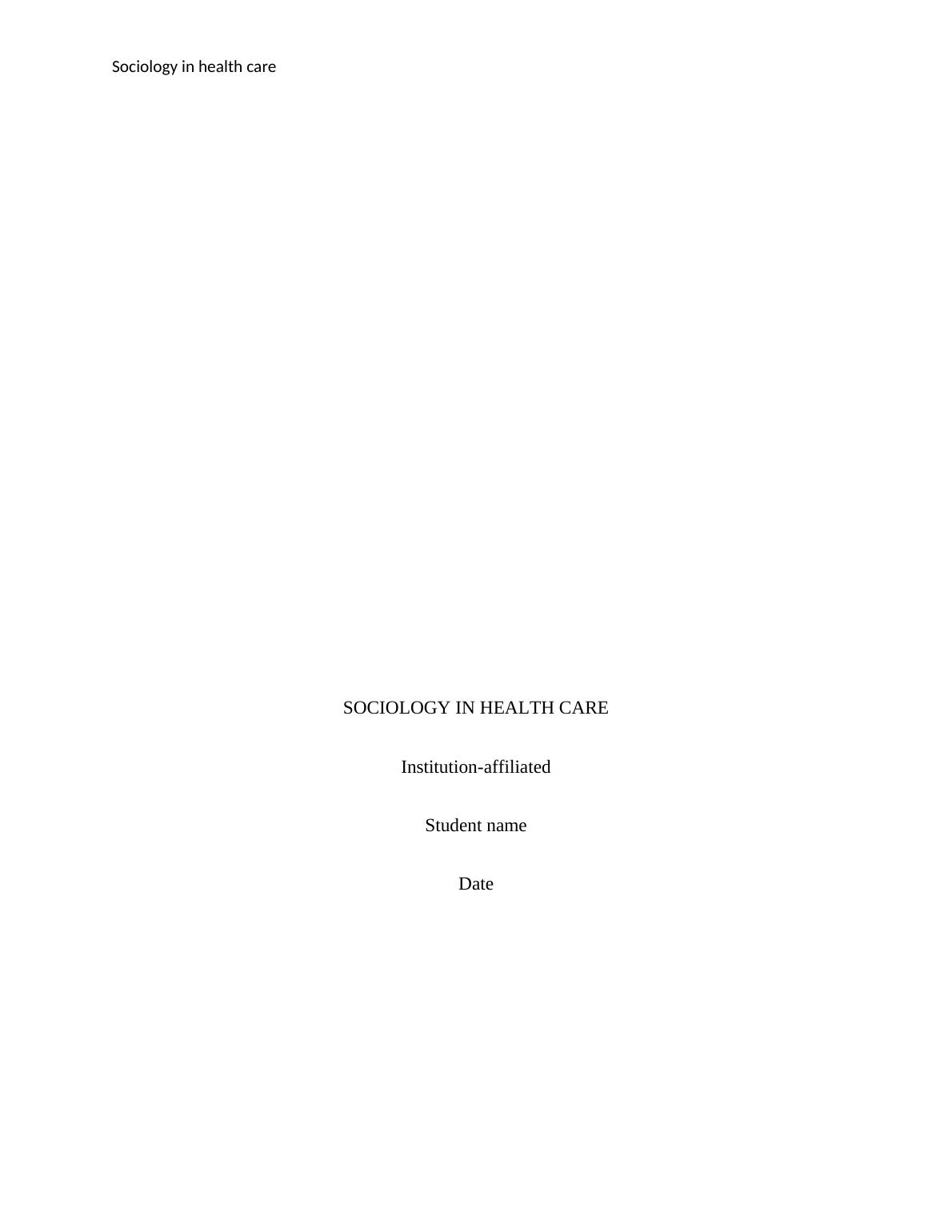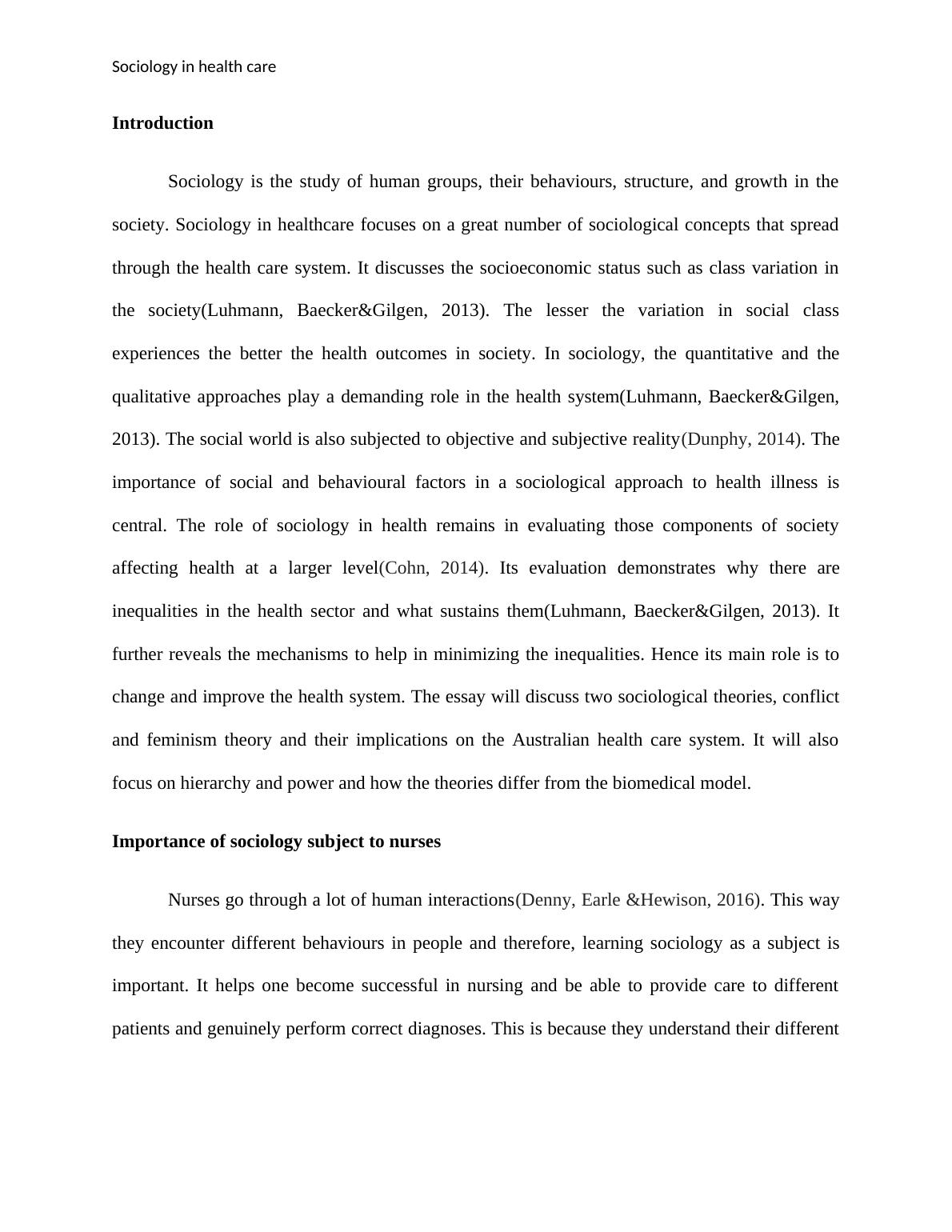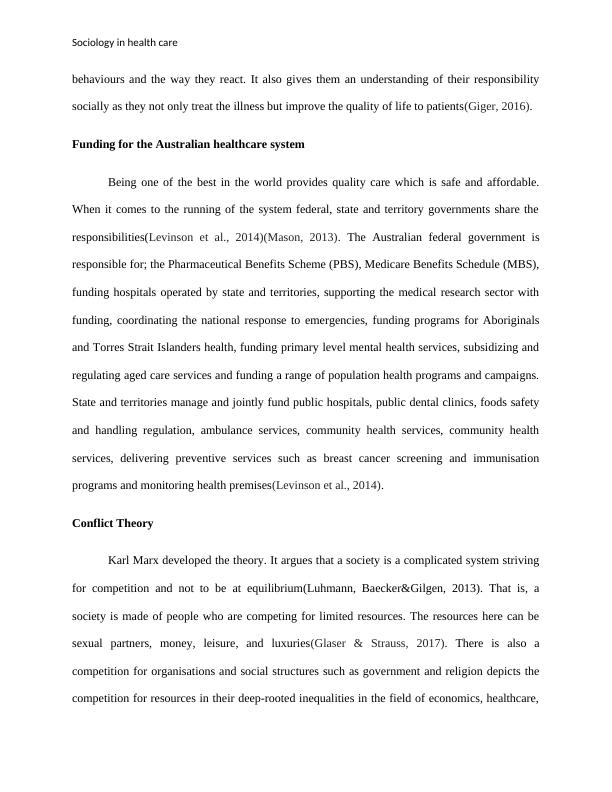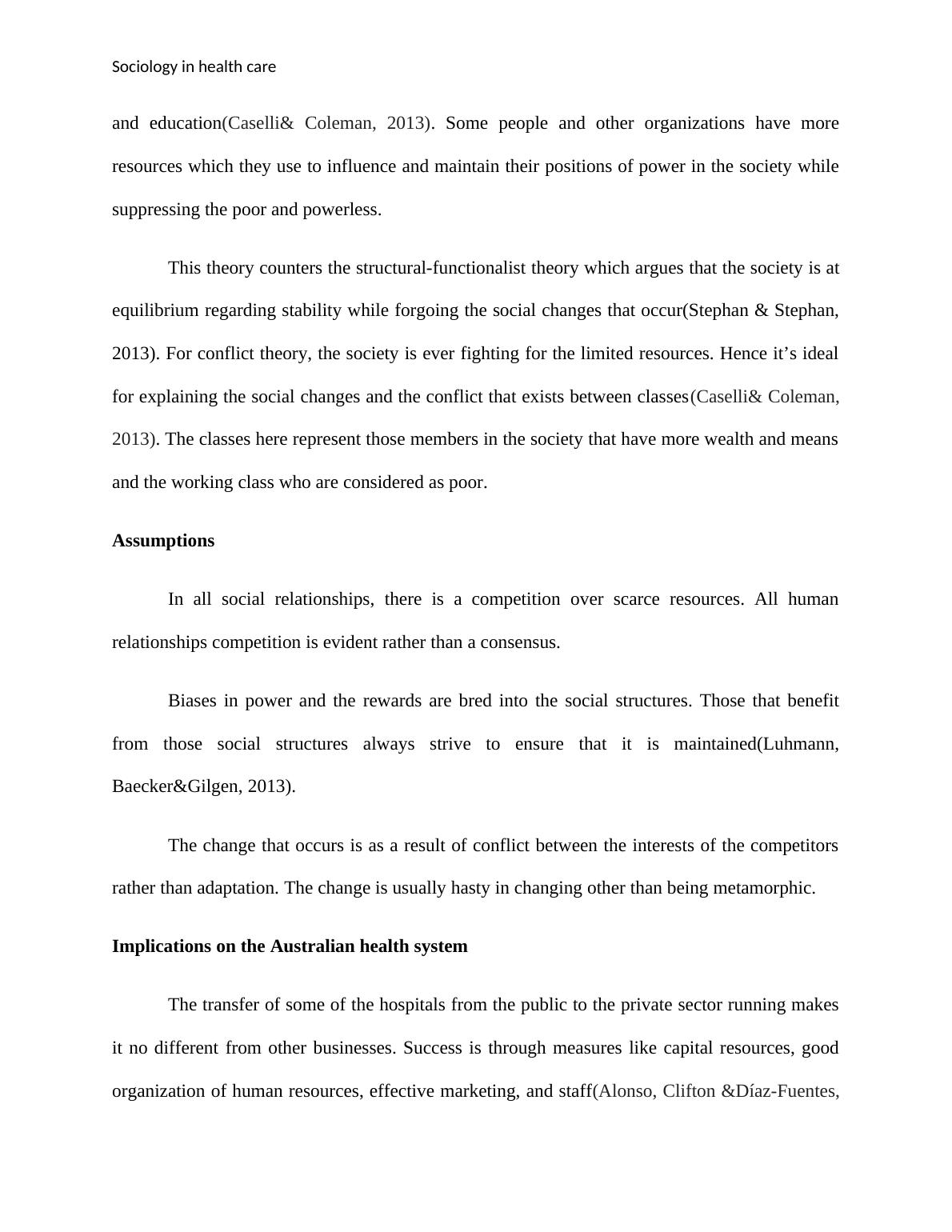Sociology in Health Care: Implications of Conflict and Feminist Theories on the Australian Health Care System
Added on 2023-06-05
16 Pages4603 Words276 Views
Sociology in health care
SOCIOLOGY IN HEALTH CARE
Institution-affiliated
Student name
Date
SOCIOLOGY IN HEALTH CARE
Institution-affiliated
Student name
Date

Sociology in health care
Introduction
Sociology is the study of human groups, their behaviours, structure, and growth in the
society. Sociology in healthcare focuses on a great number of sociological concepts that spread
through the health care system. It discusses the socioeconomic status such as class variation in
the society(Luhmann, Baecker&Gilgen, 2013). The lesser the variation in social class
experiences the better the health outcomes in society. In sociology, the quantitative and the
qualitative approaches play a demanding role in the health system(Luhmann, Baecker&Gilgen,
2013). The social world is also subjected to objective and subjective reality(Dunphy, 2014). The
importance of social and behavioural factors in a sociological approach to health illness is
central. The role of sociology in health remains in evaluating those components of society
affecting health at a larger level(Cohn, 2014). Its evaluation demonstrates why there are
inequalities in the health sector and what sustains them(Luhmann, Baecker&Gilgen, 2013). It
further reveals the mechanisms to help in minimizing the inequalities. Hence its main role is to
change and improve the health system. The essay will discuss two sociological theories, conflict
and feminism theory and their implications on the Australian health care system. It will also
focus on hierarchy and power and how the theories differ from the biomedical model.
Importance of sociology subject to nurses
Nurses go through a lot of human interactions(Denny, Earle &Hewison, 2016). This way
they encounter different behaviours in people and therefore, learning sociology as a subject is
important. It helps one become successful in nursing and be able to provide care to different
patients and genuinely perform correct diagnoses. This is because they understand their different
Introduction
Sociology is the study of human groups, their behaviours, structure, and growth in the
society. Sociology in healthcare focuses on a great number of sociological concepts that spread
through the health care system. It discusses the socioeconomic status such as class variation in
the society(Luhmann, Baecker&Gilgen, 2013). The lesser the variation in social class
experiences the better the health outcomes in society. In sociology, the quantitative and the
qualitative approaches play a demanding role in the health system(Luhmann, Baecker&Gilgen,
2013). The social world is also subjected to objective and subjective reality(Dunphy, 2014). The
importance of social and behavioural factors in a sociological approach to health illness is
central. The role of sociology in health remains in evaluating those components of society
affecting health at a larger level(Cohn, 2014). Its evaluation demonstrates why there are
inequalities in the health sector and what sustains them(Luhmann, Baecker&Gilgen, 2013). It
further reveals the mechanisms to help in minimizing the inequalities. Hence its main role is to
change and improve the health system. The essay will discuss two sociological theories, conflict
and feminism theory and their implications on the Australian health care system. It will also
focus on hierarchy and power and how the theories differ from the biomedical model.
Importance of sociology subject to nurses
Nurses go through a lot of human interactions(Denny, Earle &Hewison, 2016). This way
they encounter different behaviours in people and therefore, learning sociology as a subject is
important. It helps one become successful in nursing and be able to provide care to different
patients and genuinely perform correct diagnoses. This is because they understand their different

Sociology in health care
behaviours and the way they react. It also gives them an understanding of their responsibility
socially as they not only treat the illness but improve the quality of life to patients(Giger, 2016).
Funding for the Australian healthcare system
Being one of the best in the world provides quality care which is safe and affordable.
When it comes to the running of the system federal, state and territory governments share the
responsibilities(Levinson et al., 2014)(Mason, 2013). The Australian federal government is
responsible for; the Pharmaceutical Benefits Scheme (PBS), Medicare Benefits Schedule (MBS),
funding hospitals operated by state and territories, supporting the medical research sector with
funding, coordinating the national response to emergencies, funding programs for Aboriginals
and Torres Strait Islanders health, funding primary level mental health services, subsidizing and
regulating aged care services and funding a range of population health programs and campaigns.
State and territories manage and jointly fund public hospitals, public dental clinics, foods safety
and handling regulation, ambulance services, community health services, community health
services, delivering preventive services such as breast cancer screening and immunisation
programs and monitoring health premises(Levinson et al., 2014).
Conflict Theory
Karl Marx developed the theory. It argues that a society is a complicated system striving
for competition and not to be at equilibrium(Luhmann, Baecker&Gilgen, 2013). That is, a
society is made of people who are competing for limited resources. The resources here can be
sexual partners, money, leisure, and luxuries(Glaser & Strauss, 2017). There is also a
competition for organisations and social structures such as government and religion depicts the
competition for resources in their deep-rooted inequalities in the field of economics, healthcare,
behaviours and the way they react. It also gives them an understanding of their responsibility
socially as they not only treat the illness but improve the quality of life to patients(Giger, 2016).
Funding for the Australian healthcare system
Being one of the best in the world provides quality care which is safe and affordable.
When it comes to the running of the system federal, state and territory governments share the
responsibilities(Levinson et al., 2014)(Mason, 2013). The Australian federal government is
responsible for; the Pharmaceutical Benefits Scheme (PBS), Medicare Benefits Schedule (MBS),
funding hospitals operated by state and territories, supporting the medical research sector with
funding, coordinating the national response to emergencies, funding programs for Aboriginals
and Torres Strait Islanders health, funding primary level mental health services, subsidizing and
regulating aged care services and funding a range of population health programs and campaigns.
State and territories manage and jointly fund public hospitals, public dental clinics, foods safety
and handling regulation, ambulance services, community health services, community health
services, delivering preventive services such as breast cancer screening and immunisation
programs and monitoring health premises(Levinson et al., 2014).
Conflict Theory
Karl Marx developed the theory. It argues that a society is a complicated system striving
for competition and not to be at equilibrium(Luhmann, Baecker&Gilgen, 2013). That is, a
society is made of people who are competing for limited resources. The resources here can be
sexual partners, money, leisure, and luxuries(Glaser & Strauss, 2017). There is also a
competition for organisations and social structures such as government and religion depicts the
competition for resources in their deep-rooted inequalities in the field of economics, healthcare,

Sociology in health care
and education(Caselli& Coleman, 2013). Some people and other organizations have more
resources which they use to influence and maintain their positions of power in the society while
suppressing the poor and powerless.
This theory counters the structural-functionalist theory which argues that the society is at
equilibrium regarding stability while forgoing the social changes that occur(Stephan & Stephan,
2013). For conflict theory, the society is ever fighting for the limited resources. Hence it’s ideal
for explaining the social changes and the conflict that exists between classes(Caselli& Coleman,
2013). The classes here represent those members in the society that have more wealth and means
and the working class who are considered as poor.
Assumptions
In all social relationships, there is a competition over scarce resources. All human
relationships competition is evident rather than a consensus.
Biases in power and the rewards are bred into the social structures. Those that benefit
from those social structures always strive to ensure that it is maintained(Luhmann,
Baecker&Gilgen, 2013).
The change that occurs is as a result of conflict between the interests of the competitors
rather than adaptation. The change is usually hasty in changing other than being metamorphic.
Implications on the Australian health system
The transfer of some of the hospitals from the public to the private sector running makes
it no different from other businesses. Success is through measures like capital resources, good
organization of human resources, effective marketing, and staff(Alonso, Clifton &Díaz-Fuentes,
and education(Caselli& Coleman, 2013). Some people and other organizations have more
resources which they use to influence and maintain their positions of power in the society while
suppressing the poor and powerless.
This theory counters the structural-functionalist theory which argues that the society is at
equilibrium regarding stability while forgoing the social changes that occur(Stephan & Stephan,
2013). For conflict theory, the society is ever fighting for the limited resources. Hence it’s ideal
for explaining the social changes and the conflict that exists between classes(Caselli& Coleman,
2013). The classes here represent those members in the society that have more wealth and means
and the working class who are considered as poor.
Assumptions
In all social relationships, there is a competition over scarce resources. All human
relationships competition is evident rather than a consensus.
Biases in power and the rewards are bred into the social structures. Those that benefit
from those social structures always strive to ensure that it is maintained(Luhmann,
Baecker&Gilgen, 2013).
The change that occurs is as a result of conflict between the interests of the competitors
rather than adaptation. The change is usually hasty in changing other than being metamorphic.
Implications on the Australian health system
The transfer of some of the hospitals from the public to the private sector running makes
it no different from other businesses. Success is through measures like capital resources, good
organization of human resources, effective marketing, and staff(Alonso, Clifton &Díaz-Fuentes,

End of preview
Want to access all the pages? Upload your documents or become a member.
Related Documents
Hierarchy and Power: Australian Health Care Systemlg...
|12
|3745
|227
Theory Assessment for HLTENN001: Practise nursing within the Australian health care systemlg...
|13
|4248
|474
Hierarchy and Power in Australia Health Care Systemlg...
|9
|3350
|462
Hierarchy and Power: Australian Health Care Systemlg...
|13
|3801
|308
Hierarchy & Power are Intrinsic to the Health Care System in Australialg...
|10
|3665
|64
The health care system in Australialg...
|9
|1438
|25